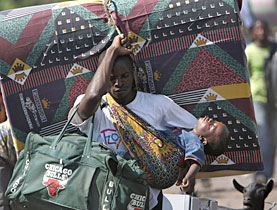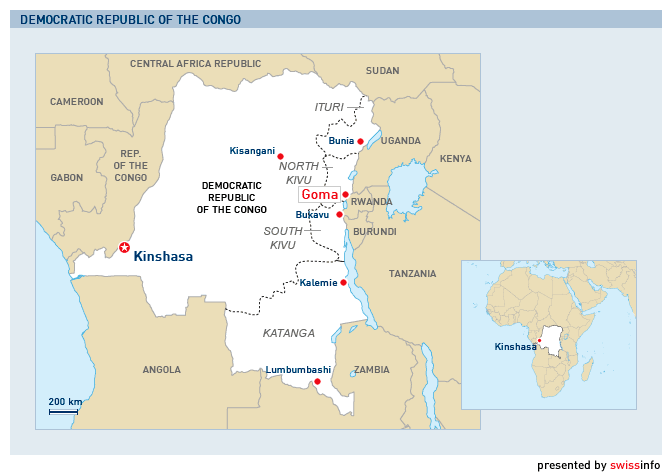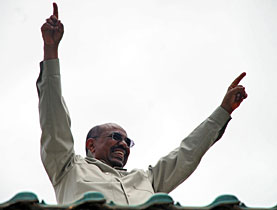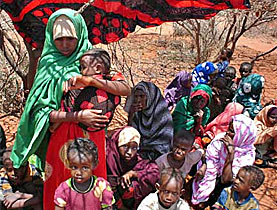Congo faces “humanitarian catastrophe”

Escalating violence in the eastern Democratic Republic of the Congo could have tragic consequences for the entire region, according to the United Nations.
Swiss aid workers on the ground say the situation has been deteriorating for some time and fears of a return to civil war have been realised.
On Wednesday rebels loyal to General Laurent Nkunda advanced on the eastern city of Goma, scattering residents and threatening to overwhelm a 17,000-strong United Nations force, known as MONUC, trying to halt a return to all-out war.
“For me this dramatic situation is unfortunately not a surprise,” said Roland Anhorn, responsible for humanitarian aid in the region for the Swiss Agency for Development and Cooperation (SDC).
“We monitor the political and military situation, and for many months there have been signs that the situation would come to a head,” Anhorn told swissinfo on Thursday.
“We could see that if peace wasn’t brokered, there would be victims – displaced people, brutal rapes, children who are recruited as soldiers and so on.”
The fighting has sent tens of thousands of civilians running for their lives in North Kivu province, where aid workers say two years of violence has forced nearly one million people from their homes despite the end of Congo’s broader 1998-2003 war.
On Wednesday UN Secretary-General Ban Ki-moon urged Congo’s government to get control of its troops in the African nation’s conflict-wracked east and to help thinly stretched UN peacekeepers protect thousands of civilians caught in the fighting.
Congolese soldiers killed at least nine people and looted homes and stores in overnight violence, according to Swiss-backed Radio Okapi on Thursday, although gunfire was reported to have died down by the morning.
Ban’s terse statement reflected a sense at the UN that it needed to address quickly the plight of a growing number of civilians frustrated at the inability of UN peacekeepers to protect them.
Ceasefire
Shortly after Ban’s statement, a spokesman for Nkunda loyalists said the rebels had declared a ceasefire on Wednesday as they reached the gates of Goma.
Nkunda, who has ignored calls by the UN Security Council to respect a UN-brokered truce signed in January, said in a telephone interview with The Associated Press that the reason he called the ceasefire was to try to stop chaos in the city.
The rebel general besieging Congo’s eastern provincial capital says he wants direct negotiations with the government to discuss security and his objections to a $5 billion (SFr5.6 billion) deal that gives China access to the region’s mineral resources.
Nkunda said he turned down a government offer of $2.5 million to stop fighting because he could not abandon his mission to protect Congo’s people.
He added that he wanted UN peacekeepers to help refugees return home.
In an attempt to mediate the crisis on Congo’s border with Rwanda, Ban was dispatching two envoys to meet the governments: deputy UN peacekeeping chief Edmond Mulet to Congo and UN special envoy to Zimbabwe Haile Menkerios to Rwanda.
The decision to send Menkerios to Kigali reflects a growing concern among UN officials that Rwanda may be providing support to Nkunda, as Congo has alleged for weeks.
Appeals
On Wednesday the International Committee of the Red Cross (ICRC) said tens of thousands of people displaced from their homes were in urgent need of temporary shelter, water, food and medical supplies.
“We’re very concerned about the safety of the people who are trapped between the warring parties, and about those who have had to leave their homes because of the latest clashes,” said Max Hadorn, head of the ICRC delegation in the Democratic Republic of the Congo.
“Under international humanitarian law, all parties to the conflict must do everything possible to respect the lives and dignity of persons not, or no longer, directly taking part in hostilities.”
The ICRC is maintaining its presence in Goma, but its workers are confined to their offices. As soon as conditions permit, the ICRC says it is ready to support the displaced population around the city with food, drinking water and essential household items.
The UN High Commission for Refugees (UNHCR) said up to 45,000 uprooted people had left camps for the displaced and headed to Goma on Wednesday. The agency also said more than 1,000 villagers fled to neighbouring Uganda, with many more expected to follow.
Roland Anhorn told swissinfo the SDC was in constant contact with their partners in the field and could well imagine ‘Goma Crisis’ flash appeals by the ICRC, the World Food Programme, the UNHCR and maybe Médecins Sans Frontières.
“The situation is not looking good,” he said.
swissinfo, Thomas Stephens
Switzerland has been active in the Great Lakes region (Rwanda, Burundi, Congo) since the 1960s. The first phase of its development assistance began in 1963 in Rwanda, following that country’s independence. Rwanda remained one of Switzerland’s development priorities until the genocide in 1994.
Beginning in 1990, Switzerland diversified its support for the region in response to new humanitarian needs arising from the crises and conflicts in Rwanda (1990-1994), Burundi (1993-2000) and Congo (1996-2001).
During this time, Switzerland’s humanitarian aid programme in particular began to take part in domestic and international emergency aid and reconstruction efforts in Rwanda, Burundi, Tanzania, eastern Congo and northern Uganda.
In 1998 Switzerland started providing diplomatic support to facilitate peace processes in Burundi and Congo, which led, respectively, to the Arusha accords in 2000 and the Pretoria accord in 2002. Today, Switzerland continues its work in conflict prevention and human rights advocacy in these two countries.
Just over five years since war broke out in Darfur, the situation remains grim. Peace talks have failed to get off the ground, only 9,000 of the 26,000-strong hybrid United Nations-African Union peacekeeping mission have been deployed and two-thirds of the region’s population are dependent on the world’s largest aid operation.
The conflict, which has claimed over 200,000 lives and displaced 2.5 million people in Sudan and 400,000 into Chad, has become more complex and seems to have entered a new phase.
The unrest in eastern Congo has been fuelled by festering hatreds left over from the 1994 Rwandan genocide, in which half a million Tutsis were slaughtered. More than a million Hutu extremists fled to Congo where they regrouped in a militia that helps fuel the continuing conflict in Congo.
Laurent Nkunda, an ethnic Tutsi and former general, quit the army several years ago, claiming the government of President Joseph Kabila was not doing enough to protect minority Tutsis from the Hutu extremists.


In compliance with the JTI standards
More: SWI swissinfo.ch certified by the Journalism Trust Initiative



You can find an overview of ongoing debates with our journalists here. Please join us!
If you want to start a conversation about a topic raised in this article or want to report factual errors, email us at english@swissinfo.ch.